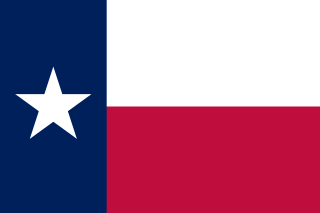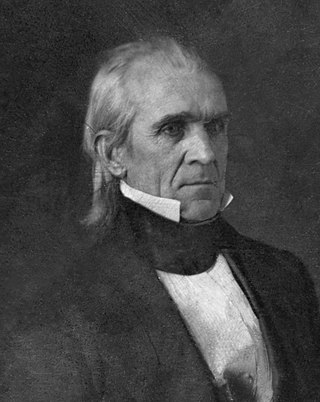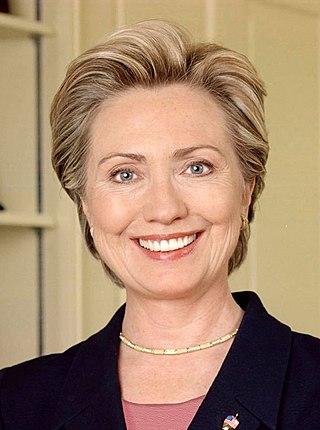
Texas is the most populous state in the South Central region of the United States. It borders Louisiana to the east, Arkansas to the northeast, Oklahoma to the north, New Mexico to the west, and the Mexican states of Chihuahua, Coahuila, Nuevo León, and Tamaulipas to the south and southwest. Texas has a coastline with the Gulf of Mexico to the southeast. Covering 268,596 square miles (695,660 km2), and with over 30 million residents as of 2023, it is the second-largest U.S. state by both area and population.

The 1844 United States presidential election was the 15th quadrennial presidential election, held from Friday, November 1 to Wednesday, December 4, 1844. Democrat James K. Polk defeated Whig Henry Clay in a close contest turning on the controversial issues of slavery and the annexation of the Republic of Texas. This is the only election in which both major party nominees served as Speaker of the House at one point, and the first in which neither candidate held elective office at the time.

The governor of Texas heads the state government of Texas. The governor is the leader of the executive and legislative branch of the state government and is the commander in chief of the Texas Military. The current governor is Greg Abbott, who took office in 2015.

John Cornyn III is an American politician, attorney, and former jurist serving as the senior United States senator from Texas, a seat he has held since 2002. A member of the Republican Party, he served on the Texas Supreme Court from 1991 to 1997 and as the attorney general of Texas from 1999 to 2002.

The 2008 United States presidential election was the 56th quadrennial presidential election, held on November 4, 2008. The Democratic ticket of Barack Obama, the junior senator from Illinois, and Joe Biden, the senior senator from Delaware, defeated the Republican ticket of John McCain, the senior senator from Arizona, and Sarah Palin, the governor of Alaska. Obama became the first African American to be elected to the presidency, as well as being only the third sitting United States senator elected president, joining Warren G. Harding and John F. Kennedy. Meanwhile, this was only the second successful all-senator ticket since the 1960 election and is the only election where both major party nominees were sitting senators. This was the first election since 1952 in which neither the incumbent president nor vice president was on the ballot, as well as the first election since 1928 in which neither ran for the nomination.

Super Tuesday is the United States presidential primary election day in February or March when the greatest number of U.S. states hold primary elections and caucuses. Approximately one-third of all delegates to the presidential nominating conventions can be won on Super Tuesday, more than on any other day. The results on Super Tuesday are therefore a strong indicator of the likely eventual presidential nominee of each political party.

The 2004 United States presidential election in Texas took place on November 2, 2004, and was part of the 2004 United States presidential election. State voters chose 34 representatives, or electors to the Electoral College, who voted for president and vice president.

Texas's 14th congressional district for the United States House of Representatives stretches from Freeport to Orange, Texas. It formerly covered the area south and southwest of the Greater Houston region, including Galveston, in the state of Texas.

Texas' 24th congressional district of the United States House of Representatives covers much of the suburban area in between Fort Worth and Dallas in the state of Texas and centers along the Dallas–Tarrant county line.

The 2008 elections for the Texas delegation of the United States House of Representatives was held on November 4, 2008. 31 of 32 congressional seats that make up the state's delegation were contested. In Texas's 14th congressional district no one challenged incumbent Ron Paul. Since Representatives are elected for two-year terms, those elected will serve in the 111th United States Congress from January 4, 2009, until January 3, 2011.

The 2008 United States Senate election in Texas was held on November 4, 2008. Incumbent Republican John Cornyn defeated Democratic nominee Rick Noriega, a member of the Texas House of Representatives, to win re-election to a second term in office.

The secretary of state of Texas is one of the six members of the executive department of the State of Texas in the United States. Under the Constitution of Texas, the appointment is made by the governor of Texas, with confirmation by the Texas Senate.

The 2008 Texas Democratic presidential primary and caucuses were a series of events to determine the delegates that the Texas Democratic Party sent to the 2008 Democratic National Convention. Delegates were selected using results from two sources: the Texas Presidential Primary held on March 4 by the Secretary of State of Texas's office, and a series of caucus events held between March 4 and June 7 by the Texas Democratic Party. The indecisive results of Super Tuesday, and the fact that Texas had the largest number of delegates among the states remaining on the Democratic primary calendar, resulted in the Texas primary receiving significant attention from both the Hillary Clinton and Barack Obama campaigns.

The 2008 United States presidential election in Texas took place on November 4, 2008, and was part of the 2008 United States presidential election. Voters chose 34 representatives, or electors to the Electoral College, who voted for president and vice president.

The 2010 U.S. congressional elections in Texas were held on November 2, 2010, to determine who will represent the state of Texas in the United States House of Representatives. Representatives are elected for two-year terms; those elected served in the 112th Congress from January 2011 until January 2013.

The 2012 United States presidential election in Texas took place on November 6, 2012, as part of the 2012 United States presidential election in which all 50 states plus the District of Columbia participated. Texas voters chose 38 electors to represent them in the Electoral College via a popular vote pitting incumbent Democratic President Barack Obama and his running mate, Vice President Joe Biden, against Republican challenger and former Massachusetts Governor Mitt Romney and his running mate, Congressman Paul Ryan.

The 1964 United States presidential election in Texas was held on November 3, 1964, as part of the 1964 United States presidential election. The Democratic Party candidate, incumbent President Lyndon B. Johnson, comfortably won his home state of Texas with 63.32% of the vote against the Republican Party candidate, Senator Barry Goldwater of Arizona, who won 36.5%, giving him the state's 25 electoral votes and a victory margin of 26.8 percentage points. Johnson won the 1964 election in a landslide, carrying 44 states plus the District of Columbia, which participated for the first time. Goldwater only carried his home state of Arizona, along with five Deep South states which had been historically Democratic, but defected to the Republican Party due to the Democratic Party’s support for civil rights. Due to its status as Johnson's home state, in 1964, Texas was the most Democratic of the 11 states of the former Confederacy and the only one which leaned more Democratic than the nation at-large.

The 2018 Texas House of Representatives elections took place as part of the biennial United States elections. Texas voters elected state representatives in all 150 of the state house's districts. The winners of this election served in the 86th Texas Legislature. State representatives serve two-year terms in the Texas State House. A statewide map of Texas' state House districts can be obtained from the Texas Legislative Council here, and individual district maps can be obtained from the U.S. Census here.

Elections are held in Lubbock, Texas to elect the city's mayor. Currently, such elections are regularly scheduled to elect mayors to two-year terms.

The 2010 Texas House of Representatives elections took place as part of the biennial United States elections. Texas voters elected state senators in all 150 State House of Representatives districts. The winners of this election served in the 82nd Texas Legislature. State representatives serve for two-year terms.